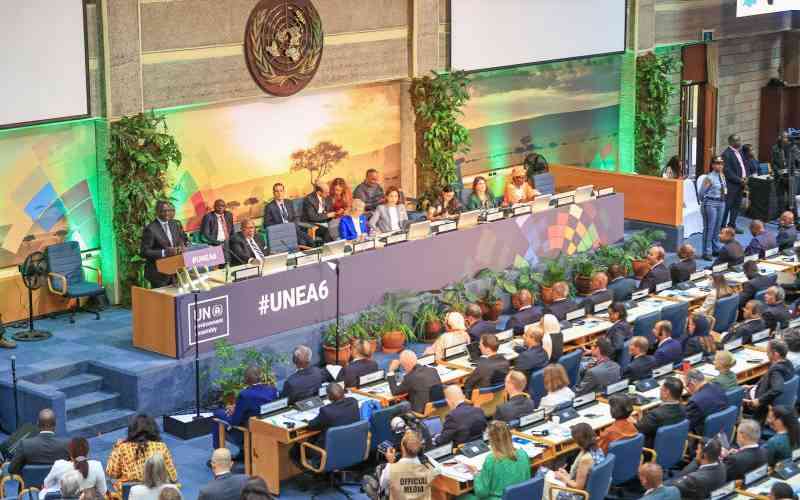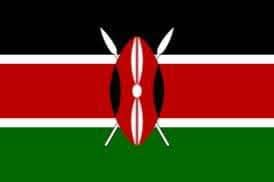Kenya Reaffirms Support for Somalia’s Sovereignty Nairobi, Kenya – May 26, 2025 — The Government…

Ruto says Africa’s collaboration key to fight climate change
Published:Feb.,29 2024 5:40 PM(EAT)
President William Ruto has called for collective action to solve the triple planetary crisis of climate change, biodiversity loss and air pollution in Africa.
Addressing the sixth session of United Nations Environment Assembly (UNEA6) at United Nations Environment Programme (UNEP) headquarters in Gigiri, Nairobi, Thursday, Ruto lauded what he termed as alignment of Africa in terms of the need to move together to address the crisis, propelled by the decisions of the COP 28 in Dubai in November last year.
“Given the magnitude and the urgency of the existential crisis that humanity and life on our planet is grappling with, only collective action at the multilateral level that is effective, inclusive will solve climate change, diversity loss and pollution,” said Ruto.
Among the historical decisions made at the COP28 were to transition from fossil fuel and tripling renewable and doubling efficiency as a collective property.
The other was positioning resilience and adaptation at the centre of climate action, clearly defining the limits connecting food systems chains, nature, health, agriculture as well as peace and security.
The Head of State said despite the progress made like operationalisation of the Loss and Damage Fund at COP28, adoption of the Kunming-Montreal Global Biodiversity Framework (KMBGF), ongoing negotiations for a legally binding global agreement aimed at ending plastic pollution, the incremental steps are no longer sufficient in the face of a rapidly escalating threat.
“On the other hand, it is important to point out that incremental steps are no longer sufficient in the face of a rapidly escalating threat. We are off-track and off-target when it comes to fulfilling critical parameters on many indicators of action and delivery,” said Ruto, who is also the chairperson of Committee of the African Heads of State and Government on Climate Change (CAHOSCC).
“Despite increased awareness and efforts, global greenhouse gas emissions are still on the rise. Pollution patterns are veering in an alarming direction, and biodiversity is confronted with multifaceted and escalating threats, along with the risk of an accelerating rate of loss,” he said.
The President emphasised that no economy, community or nation can tackle these challenges single-handedly with any hope of success and all the work must begin at home, with effective domestic measures.
He tabled Kenya’s progress in instituting a comprehensive institutional framework to anchor decisive interventions across sectors, including energy and pollution, forest conservation and critical landscape restoration, agriculture and food systems, as well as nature and biodiversity.
These actions, Ruto said, are aimed at proactively reversing the impact of climate change and promote the resilience of the people and economy.
On forest conservation and critical landscape restoration for instance, the President in December 2022 launched a 15 billion tree planting initiative by 2032.
The country is transitioning into clean energy, capitalising on its over five sources of renewable energy including solar, wind, geothermal and hydropower with target of fully transiting to renewable by 2030 from current 90 percent reliance.
Ruto said the present highly challenging circumstances demand transformative global cooperation as a matter of great urgency.
“It is imperative for us to confront this truth with honesty, and rectify glaring deficiencies which impede effective multilateralism. Our reform agenda must begin by attending to fundamental structural dimensions to re-align multilateral institutions with core values of the international community, including sovereign equality and effective democratic representation as the basis of enhanced effectiveness and inclusivity,” he said.
“If we fail in this critical endeavour, multilateralism in its present state might falter, struggle and collapse in the face of dire global crises, overwhelmed by pervasive distrust, scepticism and disengagement,” he added.
The President said time has come for Africa, which accounts for less than four percent of greenhouse emissions and yet suffers most from effects of climate change to find and apply the levers of transformational change in order to address multiple priorities simultaneously.
On circular economy, the Head of State said international collaboration is crucial in promoting the adoption of the “reduce, reuse, and recycle” life cycle approaches to waste that are vital for sustaining the blue economy and its ecosystems.
“Kenya’s response to ban single-use plastics has proved effective. To build on this progress, we are implementing the Green Economy Strategy and Implementation Plan to shift waste management to a circular economy,” he said.
Ruto, who urged the global community to advance towards a climate-neutral, resource-efficient, and circular economy, supported Africa’s position for global plastic treaty secretariat to be headquartered at UNEP.



This Post Has 0 Comments